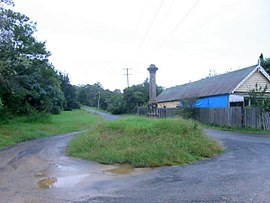Nerrigundah, New South Wales
| Nerrigundah New South Wales | |
|---|---|
 Nerrigundah and memorial obelisk | |
| Coordinates | 36°07′S 149°54′E / 36.117°S 149.900°E |
| Population | 25 (2016 census)[1] |
| Time zone | AEST (UTC+10) |
| • Summer (DST) | AEDT (UTC+11) |
| LGA(s) | Eurobodalla |
| State electorate(s) | Bega |
| Federal division(s) | |
Nerrigundah is a small village on the Eurobodalla Nature Coast in south eastern New South Wales. Situated at the head of the Tuross River Valley, it is nineteen kilometres inland from Bodalla. At the 2016 census, Nerrigundah had a population of 25.[1]
The area known today as Nerrigundah lies on the traditional lands of the Walbanga people, a group of the Yuin.[2] The place name, Nerrigundah, is derived from an aboriginal word for 'camp where edible berries grow'.[3]
Nerrigundah and its valley were used as a cattle run by Thomas Mort of Bodalla prior to the discovery of gold on 23 December 1860 by George Cook, Joseph Goodenough and William Crouch. The discovery of gold was recorded at the office of the Gold Commissioner at Braidwood, New South Wales on 2 January 1861.[4]
On 8 April 1866, Nerrigundah was raided by the Clarke brothers, Thomas and John, and their associates. They held up a number of passers-by outside the town at Deep Creek and then attacked the store and hotel. During the raid, William Fletcher, a new recruit to the Clarke gang, was shot dead as was Trooper Miles O'Grady when he tried to intervene. Trooper O'Grady was buried in Moruya and a monument to his memory erected at Nerrigundah.[5]
Although the area was already a mining settlement, the site of the Village of Nerrigundah was not reserved until April 1868.[6] The plan of the village probably reflects the irregular layout of the earlier settlement.[7]
Gold mining in the area continued into the early years of the 20th-century.[8]
After the heyday of gold mining, Nerrigundah survived as a small village sustained by local production of timber, wattle bark (for tanning) and eucalyptus oil.[9] Nerrigundah had a sawmill that provided employment, including for local Yuin people.[10] The sawmilling company also provided housing.[11] The sawmilling operation had ended by 2000.[12]
The village had a school from 1863 to 1923 and again from 1959 to 1972.[13] The village has more than one burial ground, including the cemetery dedicated in 1904.[14]
Nerrigundah was severely affected by bushfire, during the 2019–2020 Australian summer. On 31 December 2019, fire destroyed the village's hall and 20 of its 25 homes[15] and one of its residents died.[16]
References[edit]
- ^ a b Australian Bureau of Statistics (27 June 2017). "Nerrigundah (State Suburb)". 2016 Census QuickStats. Retrieved 8 July 2017.
- ^ "Tindale Tribes – Walbanga". archives.samuseum.sa.gov.au. Retrieved 28 February 2021.
- ^ "Nerrigundah". Geographical Names Register (GNR) of NSW. Geographical Names Board of New South Wales. Retrieved 7 November 2009.
- ^ Burdett, Maureen (1992). Nerrigundah: An Anecdotal History. Nerrigundah Publishing. ISBN 0-646-10963-4.
- ^ "CONSTABLE O'GRADY'S MONUMENT". Kiama Independent, and Shoalhaven Advertiser (NSW : 1863–1947). 14 March 1867. p. 3. Retrieved 28 February 2021.
- ^ "SITE FOR THE VILLAGE OF NERRIGUNDAH". New South Wales Government Gazette (Sydney, NSW : 1832–1900). 24 April 1868. p. 1159. Retrieved 28 February 2021.
- ^ "Village of Nerrigundah and adjoining lands [cartographic material] : Parishes – Nerrigundah and Cadgee, County – Dampier, Land District – Moruya, Shire – Eurobodalla, Pastures Protection District – Eden". Trove. Retrieved 28 February 2021.
- ^ "SOUTH COAST MINING". Sydney Mail and New South Wales Advertiser (NSW : 1871–1912). 23 December 1903. p. 1640. Retrieved 28 February 2021.
- ^ Magee, Stuart (January 2006). "MORUYA A SHORT HISTORY" (PDF).
- ^ "Tuross Head History". turosshead.org. Retrieved 28 February 2021.
- ^ "ALTERATION OF PURPOSE AND CONDITIONS OF SPECIAL LEASE". Government Gazette of the State of New South Wales (Sydney, NSW: 1901–2001). 14 October 1977. p. 4553. Retrieved 28 February 2021.
- ^ "COMPANY NOTICES". Government Gazette of the State of New South Wales (Sydney, NSW : 1901–2001). 18 February 2000. p. 1304. Retrieved 28 February 2021.
- ^ "Nerrigundah". nswgovschoolhistory.cese.nsw.gov.au. Retrieved 28 February 2021.
- ^ "Australian Cemeteries Index – Cemetery 1893 – Nerrigundah". austcemindex.com. Retrieved 28 February 2021.
- ^ "Bushfire aftermath: locals still living in burnt or temporary houses". Insight. Retrieved 28 February 2021.
- ^ Fife-Yeomans, Janet (21 January 2020). "Faces of heartbreak: Nation mourns 29 lives lost". Daily Telegraph. Retrieved 28 February 2021.

